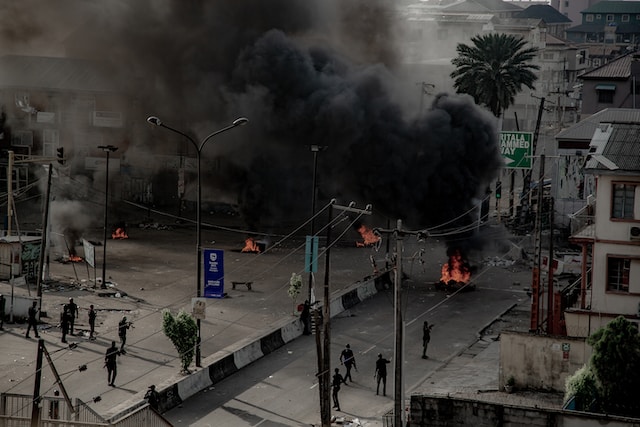South Africans can expect another Marikana and July Riots in the future. However, a full-on revolution is unlikely to occur in the country. This is the view of political analyst JP Landman and Nedbank’s chief economist Nicky Weimar, who made these comments during a Nedbank Private Wealth webinar.
Given South Africa’s problems and the cleavages in society, it is unlikely that the country will not experience outbursts of riots and looting. “We will have another Marikana. We will have another July 2021”, said Landman. According to Landman and Weimar, this is fundamentally due to a lack of economic growth. 2023 will be the eighth year running where South Africa will have declining or stagnant per capita incomes.
With elevated inflation, particularly in consumer staples such as food and energy, fertile ground for social unrest has been laid in South Africa. And so, there is the possibility for widespread unrest akin to July 2021. Just as that was unpredicted, it would be naive to think that it will not happen again if things do not change, said Weimar.
Their fears echo those of Efficient Group chief economist Dawie Roodt who is concerned about rising poverty levels and poor economic growth. Roodt said the high levels of poverty and unemployment with rising food costs is a recipe for mass unrest and disorder. It puts South Africa on the brink of disaster. “My biggest fear is that a spark can make the situation explode. It is a highly volatile situation waiting to explode,” he said.
Business sounds the alarm
PwC’s 26th Global CEO Survey and Africa Business Agenda Report for 2023 revealed that over two-thirds of Southern African CEOs expect to face disruptions from social unrest in the next 12 months.
46% of CEOs in Africa and 67% of CEOs in Southern Africa expect their companies to face high or extremely high exposure to threats from social unrest. PwC says the heightened fears of social unrest in Southern Africa are due to the region being the world’s most unequal based on income and consumption per capita.
It said the July riots were an example of what social unrest may look like in future. There was looting, violence, disruption, and the deaths of 354 South Africans. Business Leadership South Africa’s CEO, Busi Mavuso, said in February that South Africa faces an “Arab Spring-like revolt” if the government does not take decisive action.
Mavuso says that “we are in deep trouble” and “need meaningful and targeted interventions that will ensure we don’t end up in the doldrums and we don’t end up as another failed African state”. This warning has been followed by business leaders in South Africa, with MTN’s CEO, Ralph Mupita, warning that South Africa is at risk of becoming a failed state.
The fear of social unrest is not only coming from CEOs. Allianz’s Social Risk Index (SRI) has also identified South Africa as “highly vulnerable to social unrest in the next 18 months”. The South African Special Risk Insurance Association (SASRIA) has also warned of a repeat of the July riots, saying that it cannot afford to cover the country’s businesses should it see a repeat of the riots in the coming years.
Revolution is unlikely.There is some good news. Despite there being a high likelihood of social unrest in South Africa, there is a very small chance of a revolution. Weimar said social unrest would have to be highly organised to have national consequences and not spontaneous as in July 2021.
Landman agreed, saying that a complete sweeping away of the existing political system and social order will not happen in South Africa. “Before people go to that extreme, they vote and vote differently” if given a chance. As South Africa is a democracy, there are inherent “release valves” for dissatisfaction, such as peaceful protests and elections. These outlets for dissatisfaction will prevent a revolution from occurring in the country. “We will live with those tensions as we have done”, said Landman, and he does not doubt that we will get through this.
Article by: dailyinvestor.com Image via: unsplash.com

